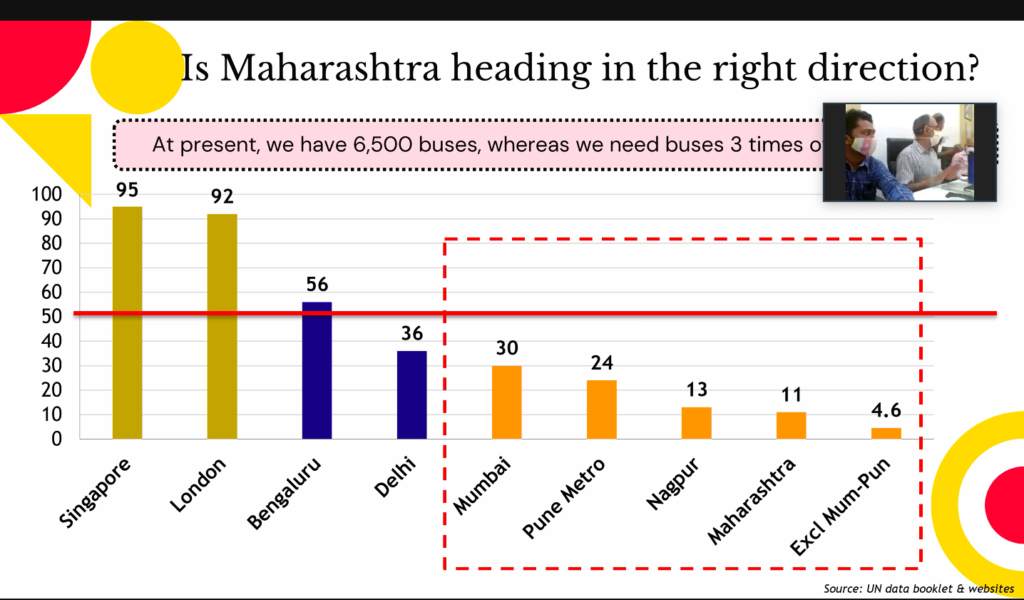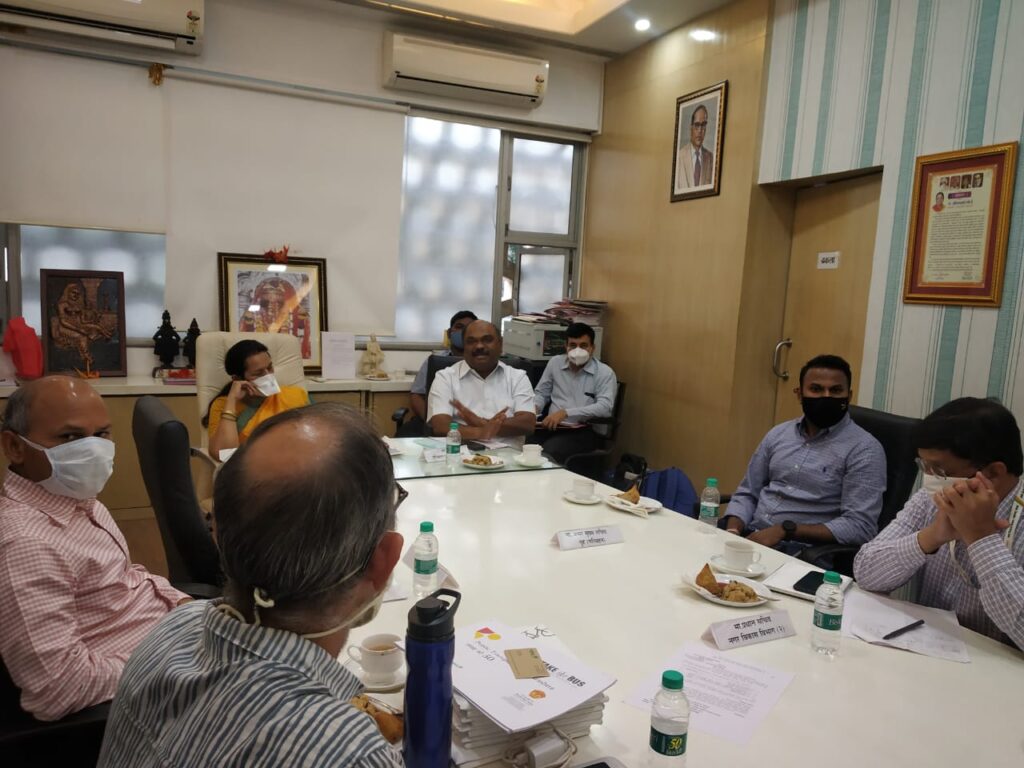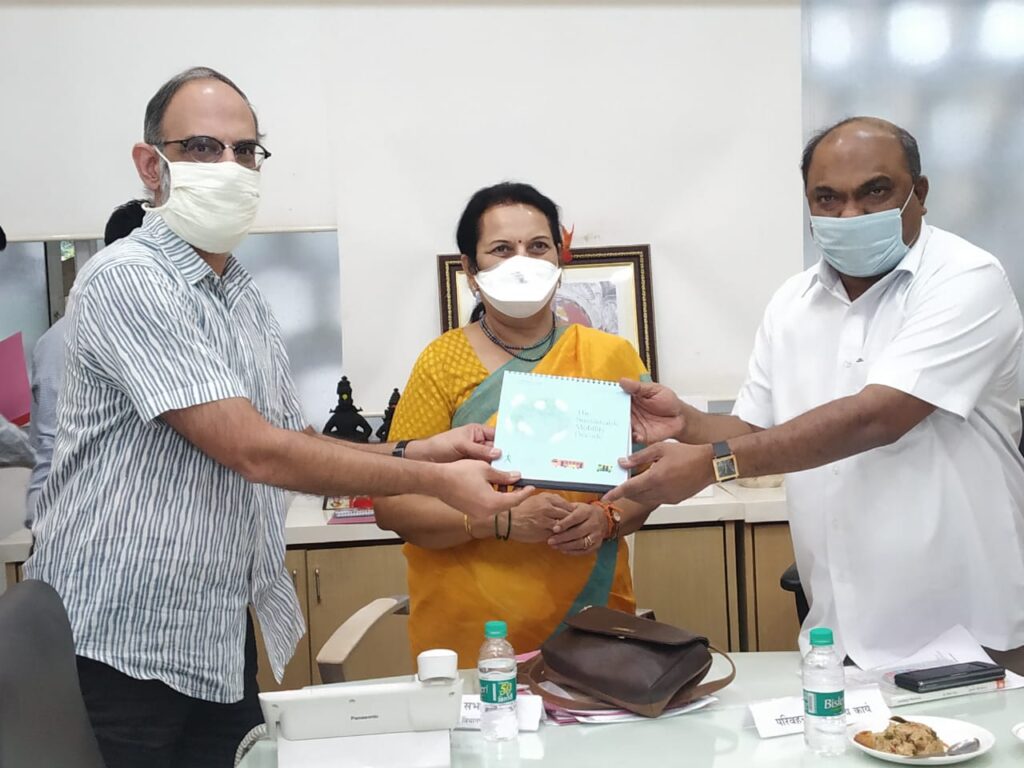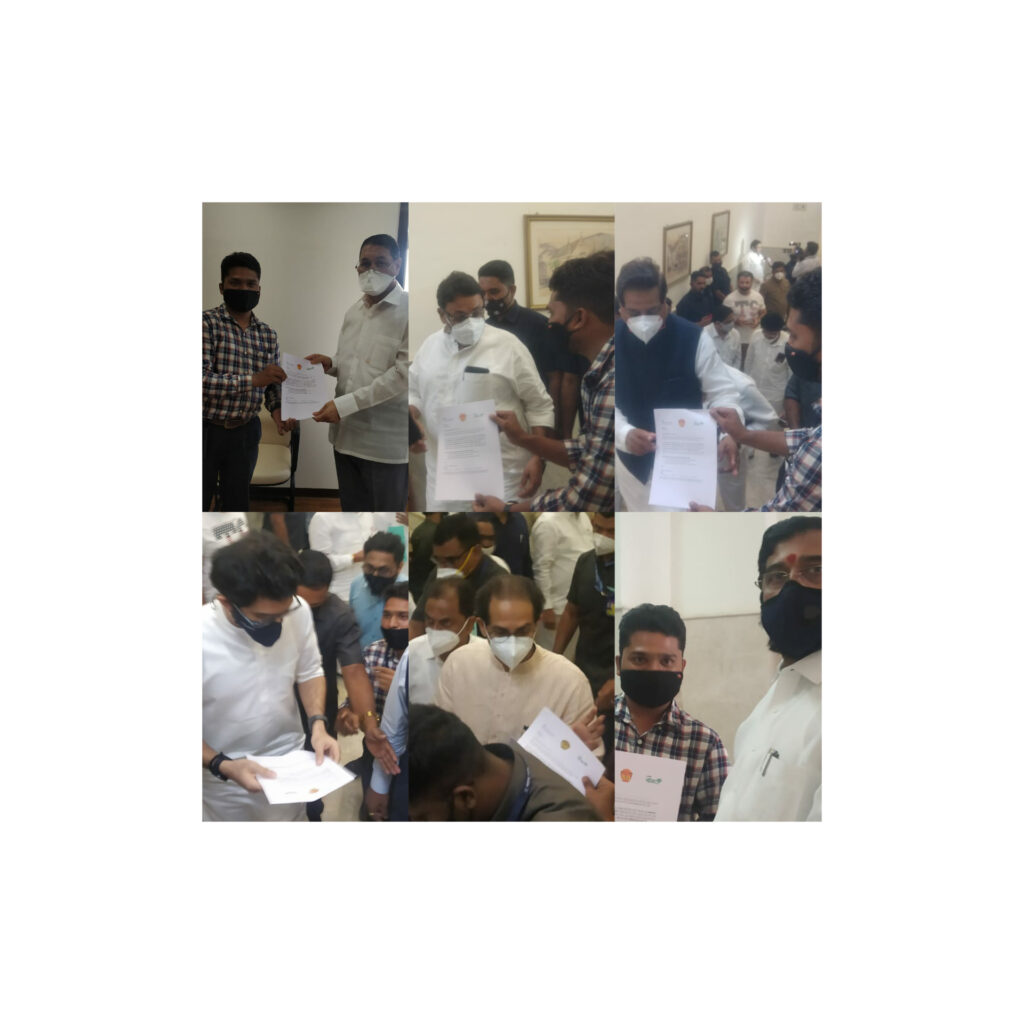Sustainable Urban Mobility Network (SUM Net), a national coalition of organisations and individuals working on sustainable urban transport solutions across India, organized a roundtable discussion at the Vidhan Bhavan on 9th February under the chairpersonship of the Deputy Speaker of the Maharashtra Legislative Council Smt. Neelam Gorhe which was attended by the state Transport Minister, Sh. Anil Parab. This roundtable was a part of the Lakh ko 50 nationwide campaign, which demands that both the National and State Governments launch a comprehensive program to ensure that cities are assured a good bus-based public transport system. The campaign highlights the need for at least 50 buses per lakh urban residents, a benchmark set by the Ministry of Housing and Urban Affairs.
Maharashtra is one of the most urbanized states in India, with over 5 crores of its population living in urban areas. Public transport is poor and even non-existent in most of the cities, which have seen an explosive growth in vehicles and with it, chronic congestion and pollution. Presenting the case for Maharashtra, Ranjit Gadgil, Program Director at Parisar, said, “Urban public transport, essential as it is, must be made a mandatory service by the 27 Municipal Corporations in the state. Preparing a draft scheme document for this, creating a regulatory framework and a technical advisory committee are few important steps to move in the direction of quality bus transport in all cities of Maharashtra.”

While the capacity of local governments to ensure this was questioned, the Deputy Chairperson of Maharashtra Legislative Council, Smt. Neelam Gorhe said, “It is crucial to systematise and prioritise the provision of good quality bus transport systems in cities—a system that will eventually also come up with ways to address the challenges of capacity, functions, etc.” Addressing the issue of capacity of local governments, Ranjit Gadgil and Professor Shivanand Swamy, Centre for Excellence in Urban Transport (CoE-UT), CEPT University provided the example of Gujarat CM Urban Bus Scheme which provisions for Viability Gap Funding up to 50% or Rs. 12.50 per km to 8 Municipal Corporations and 22 Class A Municipalities. Prashant Kakade, Manager & Co-Ordinator MDC, Central Institute of Road Transport (CIRT) also mentioned about a similar scheme in Lucknow where the Urban Transport Directorate (UTD) provides a viability gap funding to Lucknow City Transport Services Limited (LCTSL) from the urban transport fund created by the state government.

Minister of Transport, Sh. Anil Parab underlined the role of buses and said, “Buses play an important role in addressing major urban challenges like road safety, environment protection and reducing congestion and any provisions in law and policy must take into account these considerations while augmenting city bus services. Resultantly, cleaner fuel for buses, proper route rationalisation and alignment must be primary considerations when talking about improvement of bus services.” He added that Covid-19 poses another challenge with more people shifting to or wanting to shift to private vehicles.
In agreement with the overarching proposal of Public-Private Partnership (PPP) and Viability Gap Funding (VGF) models, Sh. Parab emphasized the role of Central Institute of Road Transport (CIRT), NGOs like Parisar, coalitions like SUM Net and other experts in assessing the viability and feasibility of different models for different cities of Maharashtra. Smt. Neelam Gorhe echoed this need and asked the meeting attendees to study the different operational and funding models for city bus transport which will be duly considered by the government.

Experts who attended this meeting and contributed to this important discussion include Dr. Surendranath Bagde, General Manager, BEST and Dr. Rajendra Jagtap, Chairperson and Managing Director of PMPML (Pune Mahanagar Parivahan Mahamandal). They both shared their experiences about running buses in their cities and echoed the need for long-term financial support from the State to ensure better quality services. Mr. Prashant Kakade, Manager & Co-Ordinator MDC, Central Institute of Road Transport (CIRT) talked about the importance of Urban Transport Fund and state subsidies for consistent funding to urban bus services.
Transport Expert Pranjali Deshpande talked about the multiple ways in which cess can be collected for Viability Gap Funding (VGF) like private and commercial vehicles cess, property tax cess. She also gave the example of Punjab where petrol cess is used for VGF. Shivanand H.M. Swamy, Professor, Center for Excellence in Urban Transport (CoE-UT), CEPT University who was involved in the Gujarat scheme suggested the state ought to look at GCC (Gross Cost Contract) options with bus sizes to suit the needs of the city. Ajay Gupta and Rakesh Jain from Delhi Integrated Multi-Modal Transit System (DIMTS) Ltd were also present at the meeting. From the office of the Transport Commissioner Sh. Laxman Darade, Principal Deputy Secretary Home (Transport) and Sh. Pandurang Jadhav, Principal Joint Secretary Urban Development was present.
Prior to this meeting, Parisar had organised city dialogues in Mumbai, Pune, Nagpur and Amravati which highlighted the issues faced by bus commuters, and the city-specific challenges to ensure safe, frequent and comfortable city bus services. This was followed by two state-level webinars with a diverse panel of experts, authors, bus operators, commuters, secretaries, municipal commissioners and managing directors of city transport undertakings. The Lakh ko 50 online petition received more than 10,000 signatures and the campaign’s public statement was endorsed by more than 70 organisations across Maharashtra. The campaign letter along with petition signatures has been shared with all 288 MLAs of Maharashtra and also with Chief Minister, Uddhav Thackeray.
